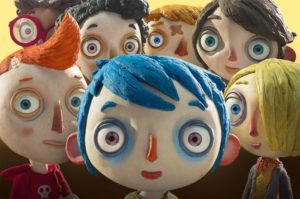My Life as a Zucchini
4/5
As far as touching pieces of filmmaking go, My Life as a Zucchini (2016) is rather well done, using its medium (stop-motion animation) and its runtime (66 minutes) to create something moving and out of the ordinary for a sort-of-children’s flick.
Really, to call My Life as a Zucchini a children’s film at all is as patronizing as it is untrue—children’s films are generally brainless and harmless, and have no illusions of doing anything besides giving tired parents a break. But children deserve films like this one, which doesn’t insult their intelligence or assume that because they’re young they can’t handle any emotions or ideas more complex than “wheee” or “hooray.”

The film’s stop-motion animation serves to capture certain simplicities of childhood by creating a world which, visually, is simple and uncluttered, while also keeping the story engaging and guiding it away from bleakness (which the subject matter could have guided it toward) and the saccharine storytelling that many live-action children-fronted films are guilty of.
The film surprises throughout by never shying away from tricky topics, and, in fact, looks at things like death, racism, sex, and violence—topics that shoddy children’s films avoid like the plague—in the same wide-eyed, unfiltered way a child might.
Perhaps its story is a tad familiar, but each step of its trajectory is told with such a refreshing, and at times delightfully inventive, perspective that it is never hackneyed or clichéd.
Furthermore, the concise runtime ensures that no moment in the film is belaboured or dull—everything counts—and because of that, the aforementioned familiarity never has time to sink in, the audience isn’t given the chance to remember where they’ve seen it before.
That said, the film is in no way trying to be something it’s not—it’s an assured piece of filmmaking with its own ideas and perspectives, and avoids many of the pitfalls that its peers do not.
My Life as a Zucchini stands as a testament to what children’s films can and should be, while, moreover, demonstrating what it is about films that we all gravitate toward—that semi-intangible need to be told stories that make us feel, children and adults alike.

